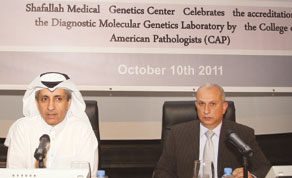 |
| Dr Khalid al-Thani speaks yesterday as Dr El-Shanti looks on |
The Shafallah Medical Genetics Centre’s Diagnostic Molecular Genetics Laboratory has become the first in Qatar and one of few in the region, to be accredited by the College of American Pathologists’ (CAP) “Laboratory Accreditation Programme”.
During the CAP accreditation process, which lasted two years, the inspectors examined the laboratory’s records and quality control of procedures as well as lab staff qualifications, its equipment, facilities, safety programme and record, in addition to the overall management of the laboratory.
CAP is a medical society that serves more than 17,000 physician members and laboratory community throughout the world.
It is the world’s largest association composed exclusively of board-certified pathologists and is widely considered the leader in laboratory quality assurance.
With the accreditation, the genetic laboratory has become one of more than 7,000 CAP-accredited laboratories world-wide and is also now a reference lab for diagnosing genetics testing.
A re-inspection of the lab is expected on July 11, 2013 to maintain accreditation and the SMGC Quality Management section head Hamda al-Mutawa has been selected as a CAP inspector.
“Our laboratory has met all the stringent measures and the applicable standards for accreditation by CAP thus becoming a reference lab that is recognised internationally for conducting genetics testing to determine causes of most of childhood disabilities,” SMGC managing director Dr Hatem el-Shanti said during a ceremony held at the Shafallah Centre yesterday.
He added that the CAP’s accreditation will earn more respect for the lab.
“We have been collaborating with a number of medical centres such as the Hamad Medical Corporation and now that we have been accredited, I believe the Corporation will prefer to conduct lab tests in a CAP accredited laboratory,” he noted while mentioning that the HMC’s lab would also soon be accredited by CAP.
El-Shanti explained that CAP’s standards are strict in order to ensure that patients receive the highest quality of services through the lab adding that the accreditation will also help fine-tune the lab’s three major roles of diagnosing, educating and researching.
“Our primary roles are three and these are for diagnosing causes of genetic diseases and disabilities in children as well as adults by looking at their deoxyribonucleic acid (DNA) and for education with focus on the public as well as conducting research activity, which is the biggest and the most extensive role we play,” he explained.
According to him, the centre is working with a group of families having children in Shafallah Centre for Children with Disabilities and Al Noor Institute.
Also speaking at the event, the Qatar National Cancer Society’s president Dr Khalid bin Jabor al-Thani described the accreditation as the “beginning for the centre” to become part of the global research centres while also urging its staff to march forward and develop its services further.
Around 30 laboratory staff who worked as a team during the accreditation process was presented with a certificate of appreciation during the ceremony.

